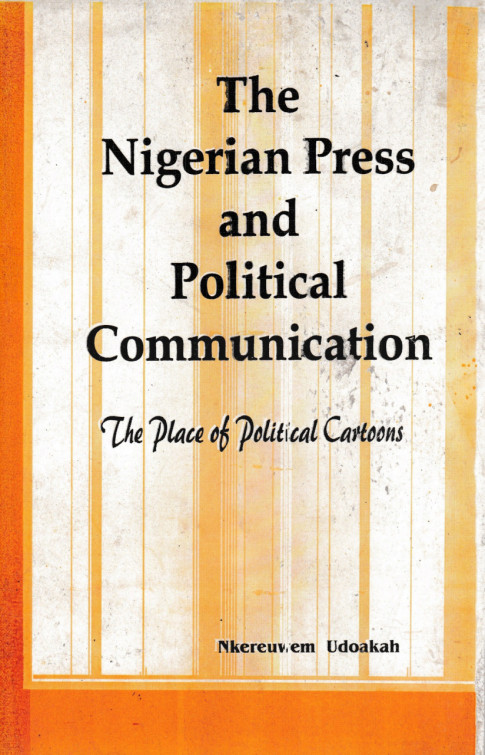The Nigerian Press and Political Communication: The Place of Political Cartoons
$5.00
Contents
Title Pages
Preface
Chapter
1. An Overview of Political Communication
2. The Press and Society
3. Political Cartoons and Communication
4. How Newspapers and Readers Use Cartoons
5. Content Analysis and Survey Results
6. Political Cartoon Readership and Potency
7. The Political Cartoonists
References
Index
Description
Preface
This book is an outgrowth of my many years of interest in political communication. I developed interest in international politics in the 1980s when I started writing on events in different countries of the world for the Sunday Chronicle in Calabar. This interest blossomed into my studying political communication along with political theory at the City of London Polytechnic, now London Guildhall University.
My experience from the course led to my first book, Government and the Media in Nigeria. Ever since, I have been involved in political
communication, teaching and researching. This book is a product of my research for a doctorate degree at the University of Uyo.
It is a book about how the Nigerian press transports political discourse and output to the citizens in the face of hostile governments. It examines the watch-dog-metaphor function of the press in a militarized society, in a democracy, and the experience of the Nigerian press in the decade preceding the Second Republic under President Shehu Shagari.
The picture that emerges is that of a press assigned a responsibility which exposes it to a strained relationship with high-handed governments. More often than not, this responsibility leads to the beating up of journalists publicly, their arrest and detention, seizures of critical editions of the newspapers and magazines and closures of press houses. Yet, the press must, and is expected to, execute this responsibility.
The book examines the communicative forms available to the press, and which ones it favours, in order to maintain the circulation of critical and independent views with minimum chances of harassment. In the circumstance of the Nigerian press, cartoons have been identified as a medium through which sensitive political issues are communicated.
One assumption behind this choice is the power of cartoons to clarify and intensify meaning, and their being easily comprehensible by the less educated. Another assumption stems from the old Chinese proverb that a picture is worth a thousand words.
But, knowing that cartoons are not pictures, and that pictures are known to have their drawbacks as a means of communication, and that cartoons are symbols that can tax the intellect, the book also explores the make up of political cartoon readership. It reveals many interesting characteristics of the readership. Apart from being politically conscious, the readership belongs to the educated class, and the active work force category in the economy.
A review is done on the African parallels of the cartoon, namely: puppetry, rock art paintings, court jesters and ‘Akata’. Some of these are still found in Nigeria today, and are assigned the responsibility of checking moral bankruptcy by keeping watch and bringing to public knowledge the ills done by members of the communities. The insight given by this philosophy of political cartooning in Nigeria derives from African socio-cultural institutions.
The idea of cartoons assuring the least risky outcome in an environment that threatens the worst possible harm is also explored. This is against the background that cartoons are unkind and exaggerated drawings of people in politics, meant to ridicule.
What presents itself from this evaluation is the fact that political cartooning is practised within the confines of the laws regulating the operations of the press in a given society. Furthermore, feedback from the government and the proprietors of the press has contributed to the shaping and revising of the concept and communicative role of political cartoons in Nigeria. So, even though the use of cartoons has given some degree of succour to the Nigerian press, it does not shield it completely from unnecessary state
intervention.
The book ends with a highlight of some political satirists, who daily adorn the pages of some Nigerian newspapers and magazines with rib-cracking jokes and comic strips.
I have found favour in the sight of God and men at the research and publishing stages of this book. May God continue to take the glory! I owe Dr. Des Wilson, my colleague and friend, much gratitude for his help at the research stage of this book. Many more helped at that stage, and I appreciate them all. I thank Mr. Etim Anim for facilitating the publication of this book.
Finally, I am grateful to my wife, Lucy, for providing everything that others could not for the success of this book.
Nkereawem Udoakah
Decemeber 2003
Prof. Nkereuwem Udoakah
Nkereuwem Udoakah is a former newspaper journalist, now a Professor in Communication Arts in the University of Uyo, Nigeria. His professional experience includes reporting and editorial work with the Nigerian Chronicle and Quest Magazine, published by the Cross River State Newspaper Corporation, Calabar. He worked as a sub-editor, editorial assistant, feature writer, production editor and assistant editor on those publications. He became the officer responsible for fund-raising at the University of Cross River State (now University of Uyo) before joining the academic staff. Prof. Udoakah is a member of the Advertising Practitioners Council of Nigeria (APCON), the Nigeria Union of Journalists (NUJ) and the Nigerian Institute of Public Relations (NIPR). His research interests include journalism and media Studies, politics and the media, and development communication. He is the author of Government and the Media in Nigeria, Development Communication and Issues in Media Practices. He has many book chapters and journal articles to his credit. Prof.
Udoakah had his professional training in Ghana and Britain.
Questions and Answers
You are not logged in
